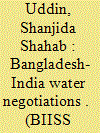| Srl | Item |
| 1 |
ID:
159611


|
|
|
|
|
| Summary/Abstract |
Sharing river water between neighbours is a complicated task as it creates upstream-downstream supply disputes. Having the highest number of common rivers with its biggest neighbour – India, Bangladesh has to face common water sharing disputes with that country. To resolve disputes over water sharing, Bangladesh started negotiations with India after its independence, but the country has been facing challenges in reaching a consensus on a formula and mechanism to share the common water. Given this backdrop, the present paper argues that the water negotiations between Bangladesh and India are being affected due to significant negotiation challenges which make the water negotiations a zero-sum game. With this argument, the paper endeavours to examine the challenges of Bangladesh-India water negotiations. To understand these challenges, this paper evaluates historical fact, past and ongoing water negotiations between Bangladesh and India. Some possible solutions are also suggested in the paper to overcome these challenges.
|
|
|
|
|
|
|
|
|
|
|
|
|
|
|
|
| 2 |
ID:
123175


|
|
|
|
|
| Publication |
2013.
|
| Summary/Abstract |
Abstract This article tests the assertion that narratives constructed around international environmental issues serve to promote or reduce opportunities for their resolution. It does this by interpreting the influence of Lebanese and Israeli environmental narratives on resolution of and indirect negotiations over the Upper Jordan River conflict. Colonial archives, key informant interviews and academic and policy literature serve to identify and critically investigate the narratives. An official Lebanese narrative of adherence to international law is found to contradict the more popular nationalist narrative of Israeli 'theft' of the flows. An Israeli water security discourse is found to be built on earlier narratives that have long held water (and the Upper Jordan flows in particular) as both a physically scarce and strategic commodity necessary for continued existence of the Israeli state. Basic discourse, security studies and negotiation theory is developed to gauge the influence of the narratives during the 2002 informal negotiations over the Wazzani pumping station dispute. The more influential Israeli discourse is found to establish the starting point (no discussion on re-allocation of the flows) and process of the informal negotiations. The narratives are found to open or shut windows for resolution of the conflict, by politicizing or securitizing ideas about the flows, respectively. The conflict management approach favored by US and EU mediators is seen to align with the more dominant discourse, at the cost of enduring asymmetry and tensions, and missed opportunities for both resolution of the conflict and promotion of fair water-sharing norms.
|
|
|
|
|
|
|
|
|
|
|
|
|
|
|
|